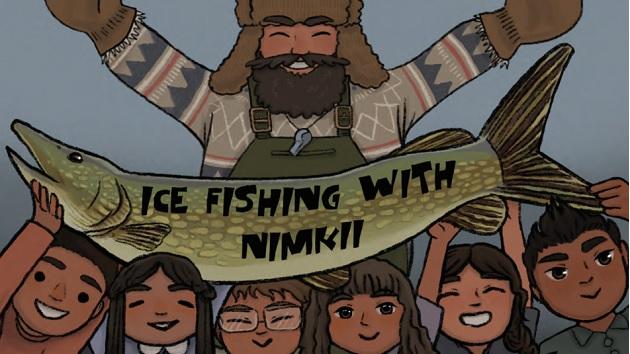Revitalizing Language, Spreading the Joy of Reading
Innovations for Learning Canada’s custom e-books get kids in Indigenous communities ‘excited about reading’

In a delightful moment of improvisation, children at a book launch blurred the line between fiction and reality.
They had gathered for the June 2022 release of the picture book Ice Fishing with Nimkii, a story written about and for the children of Wiikwemkoong First Nation on Manitoulin Island in Ontario.
In the book, Nimkii—inspired by the real Nimkii Lavell, the land-based learning lead with the Wiikwemkoong Board of Education—teaches Anishinaabe children how to ice fish with a gill net on Lake Huron.
The book includes words in Anishinaabemowin, the endangered language of the Ojibwe whose traditional territory is in the Great Lakes region of Canada and the United States.
During the reading, when Nimkii came to the part about the children in the story counting fish, the children at the book launch, unrehearsed and unprompted, began counting along in Anishinaabemowin.
“It was such a cool moment,” recalls Fabrice Grover, executive director of Innovations for Learning Canada, the literacy not-for-profit that published the book. “You could see the joy of these kids when they were pronouncing those words. They’re learning to read, and learning their language at school. It was really powerful.”
IFL, which will rebrand as Chapter One in 2023, published Ice Fishing with Nimkii as part of its series of e-books produced for and in conjunction with partner communities across the country, the majority of which are Indigenous. The non-profit expects to complete 30 custom titles by the end of this school year and plans to launch an online library, giving readers around the world free access to the collection.
Enbridge is a proud supporter of IFL, which also operates in the United States and United Kingdom. Literacy is the foundation of lifelong learning and education, and with Canada's National Day for Truth and Reconciliation fast approaching on Friday, this unique e-book project makes real strides to help children and youth develop their potential, as well as honor and protect their culture.
We recently provided a C$62,000 Fueling Futures grant to IFL in Canada to support its high-impact, one-on-one tutoring and read-with-a-virtual-coach enrichment programs, and develop two new e-books. We also provided US$66,000 funding in the U.S. to support IFL’s tutoring programs and storybooks stateside as well.
“In Canada, there are 100,000 kids every year who don’t complete Grade 3 reading at their grade level,” Grover explains, adding that literacy rates in early grades plummeted because of school closures during the COVID-19 pandemic.
A child who doesn’t read proficiently by the end of Grade 3 is four times less likely to graduate from high school.
IFL’s two tutoring programs are at work in schools in Alberta, British Columbia, Ontario, and Yukon, and will expand to the rest of the prairie provinces and to the East Coast during the 2022-23 and 2023-24 school years.
Kids 5, 6 and 7 years of age take part in the high-impact tutoring program, attending daily, five-minute sessions at school with an IFL Early Literacy Interventionist recruited from the community and trained on IFL’s platform to deliver high-frequency phonics instruction.
Once kids can decode three-letter words, they are paired with a virtual reading coach in IFL’s enrichment tutoring program, which matches young learners with volunteers to read together for 30 minutes per week. Notably, 75% of the students IFL works with are Indigenous students living on reserves.
The e-book project complements the tutoring, helping communities with two needs, Grover says:
- urgently helping kids catch up on their reading.
- advancing language revitalization, one of the 94 Calls to Action specified by the Truth and Reconciliation Commission of Canada.
“Books should provide kids with an opportunity to feel proud of their culture and connect them with languages that are part of their heritage, but are going extinct,” he explains. “Often, schools lack early reading resources that reflect the realities of these communities. For kids to feel excited about reading, the themes need to be relevant to them so they can see themselves in the stories.
“The e-books also provide an opportunity for non-Indigenous reading coaches and students to explore the original language and culture of the communities together.”
That’s the gap IFL aims to bridge.
Notes Grover: “We aspire to engage communities to the fullest extent. It’s not enough to just help kids learn to read in English. We have an opportunity to aid in local language revitalization, making our efforts to advance literacy even more powerful.”

